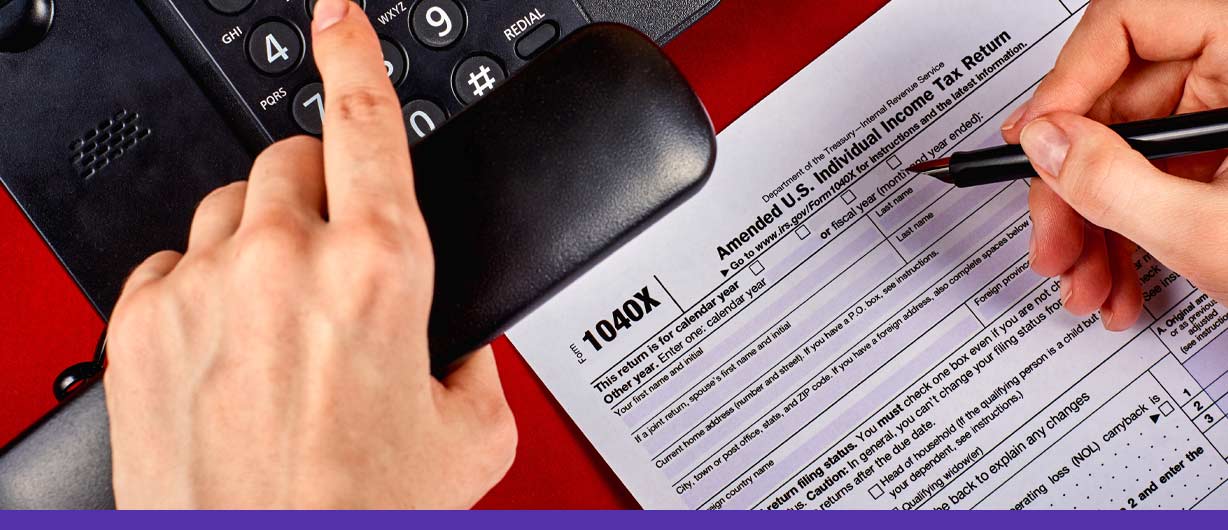July 7 2023 | By Farwah Jafri | 7 minutes Read

Step-by-step Guide on How to Contact IRS Customer Service
Step 1: Gather the necessary information
Step 2: Determine the reason for your call on IRS phone number
Step 3: Choose the appropriate contact method
Step 4: Prepare for your call or visit
Step 5: Make the call or visit the IRS office
Step 6: Communicate with the IRS representative
Step 7: Take notes and record important details
Step 8: Follow up if necessary
When not to call the IRS
1. During peak periods
2. General information inquiries
3. Tax refund status
4. Payment plan changes
5. Third-party inquiries
6. Tax law interpretation or advice
7. Scam or phishing attempts
Endnote
Dealing with taxes can be challenging and complex, especially when faced with questions or concerns regarding your tax returns or payments. While the Internal Revenue Service (IRS) offers various online resources and tools to assist taxpayers, sometimes nothing beats the comfort and assurance of speaking directly with a real person. This blog post will explore the IRS phone number, its customer service capabilities, and the human help options available to people seeking assistance with their tax-related matters.
When contacting the IRS, having access to knowledgeable professionals who can guide you through the tax system can prove invaluable. While the IRS has made significant strides in enhancing its digital services, they understand that only some feel comfortable navigating the online platforms or prefer a more personalized approach to resolving their tax concerns.
To contact the IRS (Internal Revenue Service) customer service, you can follow these step-by-step instructions:
Before contacting on the IRS phone number, make sure you have the following information handy:
– Your Social Security Number (SSN) or Individual Taxpayer Identification Number (ITIN)
– Your tax return or any relevant documents related to your inquiry or issue
– Any correspondence or notices received from the IRS
Identify the specific reason for contacting the IRS. Some common reasons include:
– Questions about your tax return or tax account
– Requesting information or clarification on IRS notices or letters
– Inquiring about a refund status
– Reporting identity theft or tax fraud
– Seeking assistance with setting up a payment plan or resolving a tax debt
There are several ways to contact IRS customer service. Choose the method that suits your preference:
– Phone: This is the most common and direct way to reach the IRS. You can call the IRS customer service line on 1-800-829-1040. Note that wait times can be long, especially during peak tax season.
– Online: The IRS provides various online resources and tools that may help you find answers to your questions or resolve issues. Visit the official IRS website at: www.irs.gov and explore the relevant sections for assistance.
– In-person: You can schedule an appointment at a local IRS Taxpayer Assistance Center. Check the IRS website or call the customer service line to find the nearest location and make an appointment.
If you choose to contact the IRS by phone or in person, it’s essential to be prepared. Consider the following tips:
– Have all relevant documents, such as tax returns, notices, and correspondence, readily available.
– Write down any questions or concerns you want to address during the call or visit.
– Ensure you have a pen and paper to take notes during the conversation.
Call the IRS customer service line at: 1-800-829-1040 if you choose to call. Follow the prompts and select the appropriate options to reach a customer service representative. Be prepared for possible wait times, especially during busy periods.
If you choose to visit an IRS Taxpayer Assistance Center, arrive at the scheduled time of your appointment. Bring all necessary documents and be prepared to wait if needed.
Once you connect with an IRS representative, clearly explain your inquiry or issue and provide any necessary information or documentation they may request. Be patient and polite throughout the conversation, as the representative will assist you.
During your conversation or visit, take notes of any important information provided by the IRS representative. It includes the representative’s name, badge number (if applicable), and any instructions or next steps they provide.
If your issue or inquiry requires additional steps or follow-up, complete them promptly. Follow any instructions the IRS representative provides, and if necessary, maintain communication through the appropriate channels.
Remember, contacting the IRS customer service can sometimes be lengthy, so it’s important to remain patient and persistent until your issue is resolved, or your questions are answered.
Knowing when not to call the IRS (Internal Revenue Service) can help you save time and ensure that you make the most effective use of their resources. While it’s essential to reach out to the IRS for various tax-related matters, there are situations where contacting them may not be necessary or could even be counterproductive. Here’s a guide to help you understand when it’s best to avoid calling the IRS:
The IRS experiences high call volumes during certain times of the year, such as tax filing season (January to April). Calling during these peak periods may result in long wait times or difficulty getting through. If your inquiry is not urgent or time-sensitive, it might be best to wait for a less busy period.
The IRS provides a wealth of information on its website (www.irs.gov) that covers a wide range of tax-related topics. Before calling, consider searching their website or reviewing online publications and resources. Frequently asked questions (FAQs) and online resources may provide the answers you need without requiring a phone call.
Checking the status of your tax refund is a common reason people call the IRS. However, it’s only necessary to call if it has been more than 21 days since you e-filed your return or six weeks since you mailed your paper return. The “Where’s My Refund?” tool on the IRS website allows you to track your refund status quickly and conveniently.
If you have an existing installment agreement or payment plan with the IRS and you need to make changes, it’s often more efficient to handle it online. The Online Payment Agreement tool on the IRS website enables you to modify your payment plan, update your bank account details, or make other adjustments without needing a phone call.
If you’re calling the IRS on behalf of someone else, such as a family member or friend, the IRS might not provide you with information due to privacy regulations. Ensure you have proper authorization or ask the taxpayer to contact the IRS directly.
The IRS provides general guidance and assistance but cannot provide personalized tax advice or interpret tax laws for specific situations. For complex tax questions or situations requiring professional guidance, consulting a tax professional, such as a certified public accountant (CPA) or a tax attorney, is recommended.
If you receive suspicious emails, phone calls, or other forms of communication claiming to be from the IRS but appear suspicious, it’s important not to call any phone numbers provided in those messages. The IRS does not initiate contact via email or social media and will not demand immediate payment over the phone. Report any scams or phishing attempts to the IRS and the Federal Trade Commission (FTC).
Remember, calling the IRS should be reserved for specific circumstances that require their assistance. By utilizing online resources, being mindful of peak periods, and seeking professional advice, when necessary, you can save time and efficiently use your interactions with the IRS.
Navigating the intricacies of the Internal Revenue Service (IRS) can be a daunting task for any taxpayer. However, with various customer service options and human help, the IRS phone number is a vital resource for individuals seeking assistance. The IRS phone number provides a direct line of communication between taxpayers and knowledgeable representatives who can address their concerns. Whether it’s a query about tax forms, payment options, or general inquiries, contacting the IRS customer service helpline can offer valuable guidance and support.
Also Read: A Guide To IRS Form 720
Subscribe for business tips, tax updates, financial fundamentals and more.
MORE BLOGS

E-commerce has lasted the test of time indeed. It is continuing to change the way businesses operate, offering solutions that couldn’t be accessed years ago. However, […]
Learn More →
Startup financing can often feel like a maze that new business owners attempt to navigate all the time. With the variety of instruments available for funding, […]
Learn More →
The business entity principle emphasizes the necessity of maintaining distinct and separate accounting records for a business entity, ensuring that its financial transactions are kept apart […]
Learn More →